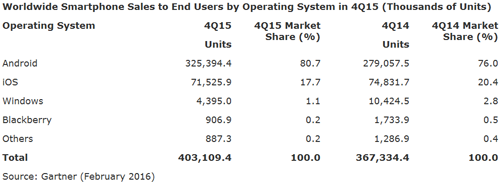News
Windows Phone Share Sinks to Just 1 Percent
- By Gladys Rama
- February 18, 2016
Seven months after being relegated to a niche business by Microsoft, Windows Phone continues to go gentle into that good night.
Microsoft's smartphone platform had just 1.1 percent of the global smartphone market in the fourth quarter of 2015, down from 2.8 percent in the year-ago period, according to data released Thursday by research firm Gartner Inc. That's also a decline of over half a percentage point from Q3 2015.
Windows Phone shipped on fewer than 4.4 million devices in Q4, a nearly 60 percent year-over-year decline.
The runaway market leader, as expected, is Google Android, which shipped on 325 million devices to capture 80.7 percent of the market.
A distant second is Apple iOS, with 17.7 percent market share. Q4 2015 marked the first period in which iPhone sales declined, according to Gartner. The firm counted 71.5 million iPhones shipped for the period, compared to 74.8 million in the previous year.

"Android benefited from continued demand for affordable smartphones and from the slowdown of iOS units in the premium market in the fourth quarter of 2015," said Gartner Research Director Roberta Cozza in a statement.
Q4 was a sluggish period for the overall smartphone market, which recorded its slowest year-over-year growth rate since 2008 at 9.7 percent.
Windows Phone's continued decline comes as no surprise; for years now, the platform has never managed to muster higher than single-digit market share. In Microsoft's most recent earnings report, Windows Phone recorded a revenue loss of nearly 50 percent.
Microsoft CEO Satya Nadella announced last July that the company was undertaking a "fundamental restructuring" in its phone business, narrowing Windows Phone's focus to three areas: enthusiasts, business users and emerging markets. To that end, Microsoft has released a handful of Lumia devices in recent months running its new Windows 10 Mobile operating system, such as the Lumia 950 and a 950 XL (for the enthusiast audience) and the Lumia 650 (for the business user audience).
"I am committed to our first-party devices including phones. However, we need to focus our phone efforts in the near term while driving reinvention. We are moving from a strategy to grow a standalone phone business to a strategy to grow and create a vibrant Windows ecosystem that includes our first-party device family," Nadella said in a memo announcing the change.
Microsoft is also preparing to release Windows 10 Mobile as a free upgrade for existing Windows Phone 8.1 users, though the rollout has been delayed at least twice now. The latest reports, which cite a Facebook post by the Microsoft Mexico account, suggest the update will be released on Feb. 29.